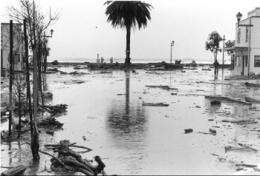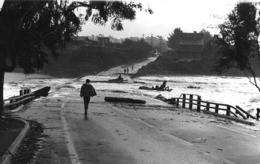Sea level rise a 'challenging issue' that needs to be addressed: scientists

Sea level is rising, and California's coastal communities will need to prepare for the gradual inundation of low-lying areas, as well as increased erosion rates and damage from storms. Gary Griggs, professor of Earth and planetary sciences at the University of California, Santa Cruz, is working on a guidebook for local government agencies to help them make the difficult the decisions ahead.
"This is going to be a challenging issue for the next century," Griggs said. "In the short term, it's hard for people to see the urgency, because there are uncertainties about how fast this is moving in on us. But we need to start planning for it now."
Griggs and UCSC graduate student Nicole Russell are working on the guidebook with funding from the California Energy Commission's Public Interest Energy Research (PIER) program. Russell discussed the project in a talk at the fall meeting of the American Geophysical Union in San Francisco on Monday, December 13.
The project will include vulnerability assessment studies for two coastal communities--Santa Cruz and Santa Barbara. Findings from these two case studies will be used to create a planning guide that any of California's coastal communities can use as they formulate strategies for adapting to a changing sea level. "The idea is to provide a cookbook or template that any community can use to assist them in determining the potential impacts of sea level rise on their community, what information they will need to do vulnerability assessments, and what adaptation strategies they should consider," Russell said.

Griggs, who directs the Institute of Marine Sciences at UCSC, is also a member of a committee established by the National Research Council (NRC) to study the issue of sea level rise on the U.S. West Coast at the request of the governors of California, Oregon, and Washington. One goal of the panel is to provide projections of sea level rise for locations on the West Coast in 2030, 2050, and 2100.
Current projections for sea level rise adopted by the California Ocean Protection Council (using 2000 as the baseline) range from 10 to 17 inches higher by 2050 and 40 to 55 inches higher by 2100. The actual change in sea level at a particular location on the coast, however, depends on both the volume of water in the oceans and changes to the adjacent land, which may be rising or sinking over time. Post-glacial rebound, a slow-motion geological reaction to the disappearance of massive glaciers that pressed down on parts of North America during the last ice age, is actually causing the land to rise faster than sea level in some locations, such as the Alaska coastline. Crescent City, Calif., near the Oregon border, is also rising faster than sea level as a result of tectonic activity.
Most of California's coastline, however, will face rising sea levels. According to Griggs, coastal communities will experience the impacts of this mostly as increases in the frequency and magnitude of events that they have experienced in the past, such as coastal flooding, storm damage, and erosion.
"It's a cumulative thing--every year sea level is a little higher, which means the effects of things like storms and El Niño events are a little more amplified," he said. "We know sea level is rising and is going to continue to rise for decades to come; the question is how fast and how high. We can't say yet, but you don't want to do things now that you might regret in the future, like new construction in vulnerable areas."
Provided by University of California - Santa Cruz















